英语必修2人教新课标Unit 1整体教案(3)
- 格式:doc
- 大小:75.00 KB
- 文档页数:6
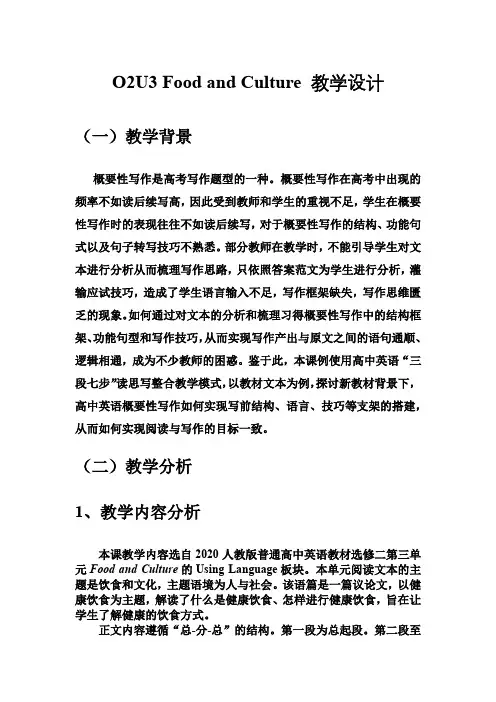
O2U3 Food and Culture 教学设计(一)教学背景概要性写作是高考写作题型的一种。
概要性写作在高考中出现的频率不如读后续写高,因此受到教师和学生的重视不足,学生在概要性写作时的表现往往不如读后续写,对于概要性写作的结构、功能句式以及句子转写技巧不熟悉。
部分教师在教学时,不能引导学生对文本进行分析从而梳理写作思路,只依照答案范文为学生进行分析,灌输应试技巧,造成了学生语言输入不足,写作框架缺失,写作思维匮乏的现象。
如何通过对文本的分析和梳理习得概要性写作中的结构框架、功能句型和写作技巧,从而实现写作产出与原文之间的语句通顺、逻辑相通,成为不少教师的困惑。
鉴于此,本课例使用高中英语“三段七步”读思写整合教学模式,以教材文本为例,探讨新教材背景下,高中英语概要性写作如何实现写前结构、语言、技巧等支架的搭建,从而如何实现阅读与写作的目标一致。
(二)教学分析1、教学内容分析本课教学内容选自2020人教版普通高中英语教材选修二第三单元Food and Culture的Using Language板块。
本单元阅读文本的主题是饮食和文化,主题语境为人与社会。
该语篇是一篇议论文,以健康饮食为主题,解读了什么是健康饮食、怎样进行健康饮食,旨在让学生了解健康的饮食方式。
正文内容遵循“总-分-总”的结构。
第一段为总起段。
第二段至第四段,作者列举了三种健康饮食的方法,并通过引用、列数据等方法使自己的论证更加具有信服力。
在上述列举的基础上,作者在最后一段进一步对健康饮食的核心进行了解读,对文章进行了总结。
就文体特征来看,该文本论述主题和论述过程准确、鲜明、严密、有针对性,按照总-分-总的方式开展议论,段落与段落之间有着较清楚的逻辑关系,每个段落内也存在清晰的结构关系。
该文本中的第二段到第四段按照逻辑顺序,围绕文章的中心,列举了三种健康饮食的方式,是一篇适宜进行概要性写作的文本;就语言来看,该文本使用了起过渡性作用的语句或关联词,如“however” “beyond this” “finally” “in other words”等,为学生在写前环节进行衔接手段的学习提供了语言支撑;就内容来看,文章话题为健康饮食,属于常见的话题,在内容上贴近学生生活,方便学生阅读和理解。
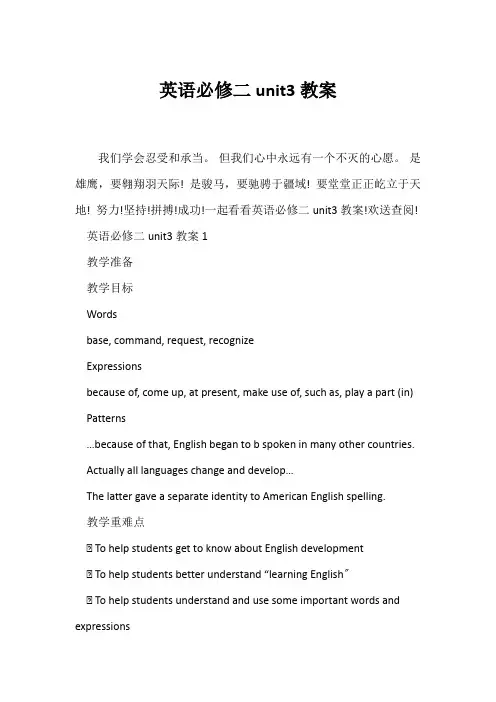
英语必修二unit3教案我们学会忍受和承当。
但我们心中永远有一个不灭的心愿。
是雄鹰,要翱翔羽天际! 是骏马,要驰骋于疆域! 要堂堂正正屹立于天地! 努力!坚持!拼搏!成功!一起看看英语必修二unit3教案!欢送查阅! 英语必修二unit3教案1教学准备教学目标Wordsbase, command, request, recognizeExpressionsbecause of, come up, at present, make use of, such as, play a part (in) Patterns…because of that, English began to b spoken in many other countries. Actually all languages change and develop…The latter gave a separate identity to American English spelling.教学重难点■ To help students get to know about English development■ To help students better understand “learning English〞■ To help students understand and use some important words and expressions■ To help students identify examples of Indirect Speech (II): request commands in the text教学工具课件教学过程■Warming up by listingGood morning, class. We have been learning English for several years. But how many English-speaking countries are there in the world Now let’s make a list of them on the blackboard.English Countries ExplanationMother tongue the United Kingdomthe United States of AmericaCanadaAustraliaSouth AfricaIrelandNew Zealand The people in these countries are native speakers of English. In total, for more than 375 million people English is their mother tongue.Second language IndiaPakistanNigeriathe Philippines These people speak the language of their own country at home but the language of the government, schools, newspapers, and TV is English.Foreign language ChinaGermanyFranceetc. The number of people who learn English as a foreign language is more than 750 million.■Warming up by answering questions about EnglishGood morning, class. Today we shall start learning Unit 2 English around the world. But how much do you know about English●What is Standard EnglishStandard English is the form of English that most people in Britain use, and that is not limited to one area or group of people.●What is a dialectA dialect is a variety of a language spoken only in one area, in which words, or grammar are slightly different from other forms of the same language.●Do we have standard Chinese What is itIn China there’re so many dialects that the government encourages the whole nation to speak Putonghua, which is regarded as standard Chinese.■Warming up by giving reasonsUnit 2 English around the world is what we are going to learn today. We are all learning English now because English is so popular in the world. But do you know why it is so How many reasons could you giving for the spread of English around the worldEnglish is one of the official languages of the Olympic Games and the United Nations.English dominates international websites and provides nearly all of the new computer terminology.Tourism and trade from Western Europe and North America has contributed to the spread of English.Satellite TV, radio programs like Joy FM, CDs and, of course, Hollywood films all broadcast English into China. Also, a number of Chinese films include English subtitles.2.Pre-readingWe are learning English here. But why are we learning it Could you suggest to the class as many reasons as you can think of, why people in the world learn Englishfor work, as a hobby, to learn about other people, to travel, to read literature in the original, to read research papers, to meet foreigners, to surf the Internet, to pass exams, etc.Go on with your reasons. I shall write your suggestions on the boardas you make them.3. Skimming the text for general ideasNow we go to page 9 to skim the text for the main idea of each paragraph.Paragraph 1: The spread of the English language in the world Paragraph 2: Native speaker can understand each other even if they don’t speak the same kind of English.Paragraph 3: English changes and develops when cultures meet and communicate with each other.Paragraph 4: By the 19th century English is settled.Paragraph 5: English is spoken as a foreign language or second language in South Asia.4. Reading and fillingRead the text to complete the chart below.Time English is influenced by…AD 450-1150 German1150-1500 FrenchIn the 1600’s Shakespeare, who make use of a wider vocabulary than ever beforeBy the 19th century Samuel Johnson, Noah WebsterNow Languages in South Asia, in Singapore, in Malaysia, in Africa and in China5. Reading and copyingNext we shall go over the text once more. This time try find and copy all the useful expressions down in your notebook.Useful expressionsat the end of…, make voyages, speak English as…, in the next century, change over time, communicate with…, be based on…, at present, become less like…, rule England, enrich the English language, make use of…, move to…, later in the 18th century, give a separate identity to…, have a very large number of…, fluent English speakers, become the language for…, develop one’s own identity, increase rapidly英语必修二unit3教案2教学准备教学目标Teaching aims:1) Get the students to master some important words, phrases and sentence patterns.2) Enable the students to use the language points by themselves.教学重难点Teaching important points:Master the usages of “more than , come up, over, be based on, present, a/ the number of〞Teaching difficult points:present: v adj教学工具课件教学过程1 Do you know that there is more than one kind of Englishmore than one 不止一个eg:More than one girl in this school holds such a view.more than one 后跟___________,作主语时,谓语动词要用______。
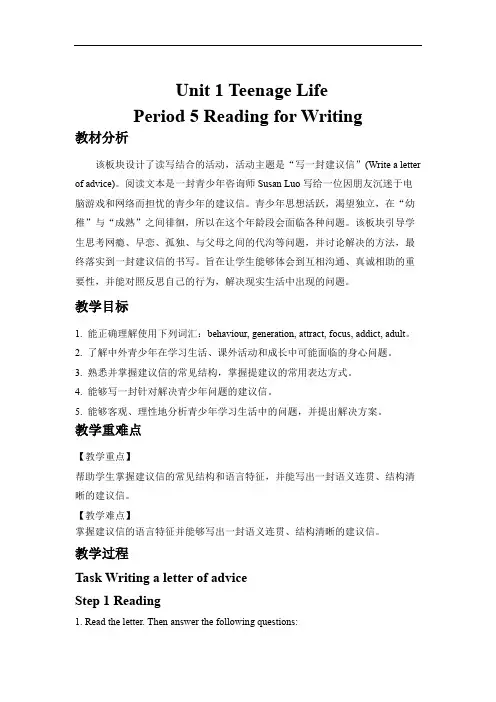
Unit 1 Teenage LifePeriod 5 Reading for Writing教材分析该板块设计了读写结合的活动,活动主题是“写一封建议信”(Write a letter of advice)。
阅读文本是一封青少年咨询师Susan Luo写给一位因朋友沉迷于电脑游戏和网络而担忧的青少年的建议信。
青少年思想活跃,渴望独立,在“幼稚”与“成熟”之间徘徊,所以在这个年龄段会面临各种问题。
该板块引导学生思考网瘾、早恋、孤独、与父母之间的代沟等问题,并讨论解决的方法,最终落实到一封建议信的书写。
旨在让学生能够体会到互相沟通、真诚相助的重要性,并能对照反思自己的行为,解决现实生活中出现的问题。
教学目标1. 能正确理解使用下列词汇:behaviour, generation, attract, focus, addict, adult。
2. 了解中外青少年在学习生活、课外活动和成长中可能面临的身心问题。
3. 熟悉并掌握建议信的常见结构,掌握提建议的常用表达方式。
4. 能够写一封针对解决青少年问题的建议信。
5. 能够客观、理性地分析青少年学习生活中的问题,并提出解决方案。
教学重难点【教学重点】帮助学生掌握建议信的常见结构和语言特征,并能写出一封语义连贯、结构清晰的建议信。
【教学难点】掌握建议信的语言特征并能够写出一封语义连贯、结构清晰的建议信。
教学过程Task Writing a letter of adviceStep 1 Reading1. Read the letter. Then answer the following questions:(1) What is Worried Friend’s problem?(2) What suggestions does Susan Luo give to Worried Friend?(3) Besides suggestions, what else does Susan Luo say in her letter?Step 2 Pre-writing2. Work on Activity 1. Students discuss the last 2 questions in groups.3. Work on Activity 2. Study the organisation and language features. Then summarize the expressions used to make suggestions.设计意图:该环节属于语言输入阶段,活动一关注阅读文本内容,活动二关注文本结构和语言特点。
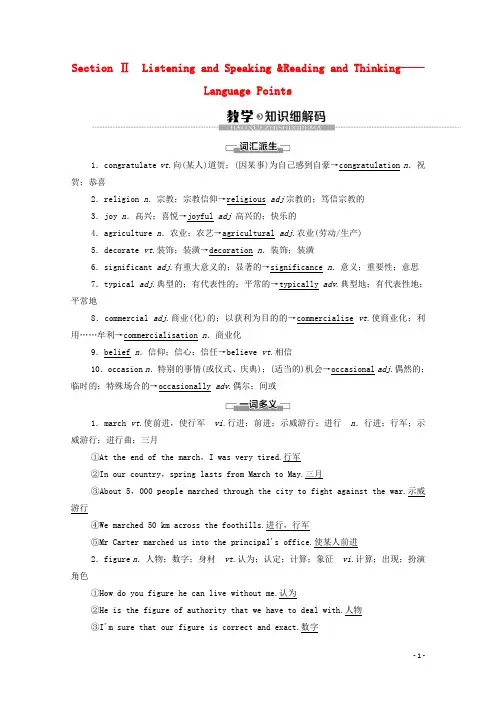
Section ⅡListening and Speaking &Reading and Thinking——Language Points1.congratulate vt.向(某人)道贺;(因某事)为自己感到自豪→congratulation n.祝贺;恭喜2.religion n.宗教;宗教信仰→religious adj宗教的;笃信宗教的3.joy n.高兴;喜悦→joyful adj高兴的;快乐的4.agriculture n.农业;农艺→agricultural adj.农业(劳动/生产)5.decorate vt.装饰;装潢→decoration n.装饰;装潢6.significant adj.有重大意义的;显著的→significance n.意义;重要性;意思7.typical adj.典型的;有代表性的;平常的→typically adv.典型地;有代表性地;平常地8.commercial adj.商业(化)的;以获利为目的的→commercialise vt.使商业化;利用……牟利→commercialisation n.商业化9.belief n.信仰;信心;信任→believe vt.相信10.occasion n.特别的事情(或仪式、庆典);(适当的)机会→occasional adj.偶然的;临时的;特殊场合的→occasionally adv.偶尔;间或1.march vt.使前进,使行军vi.行进;前进;示威游行;进行n.行进;行军;示威游行;进行曲;三月①At the end of the march,I was very tired.行军②In our country,spring lasts from March to May.三月③About 5,000 people marched through the city to fight against the war.示威游行④We marched 50 km across the foothills.进行,行军⑤Mr Carter marched us into the principal's office.使某人前进2.figure n.人物;数字;身材vt.认为;认定;计算;象征vi.计算;出现;扮演角色①How do you figure he can live without me.认为②He is the figure of authority that we have to deal with.人物③I'm sure that our figure is correct and exact.数字④She's always had a good figure.身材⑤I hadn't figured on getting home so late.计算、算到⑥I can't figure out how to do this.弄懂Words And Phrases知识要点1 congratulation n .祝贺;恭喜(教材P 2)receive congratulations from...收到来自……的祝贺[例1] I want to express my sincere congratulations on your success. 我想对你的成功表示诚挚的祝贺。
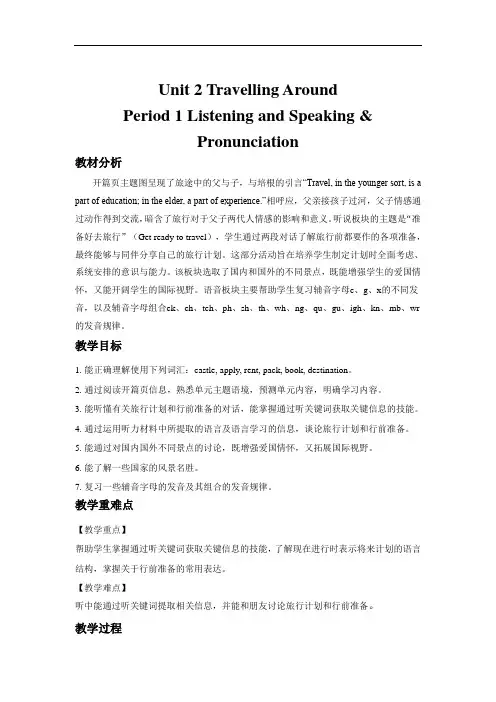
Unit 2 Travelling AroundPeriod 1 Listening and Speaking &Pronunciation教材分析开篇页主题图呈现了旅途中的父与子,与培根的引言“Travel, in the younger sort, is a part of education; in the elder, a part of experience.”相呼应,父亲接孩子过河,父子情感通过动作得到交流,暗含了旅行对于父子两代人情感的影响和意义。
听说板块的主题是“准备好去旅行”(Get ready to travel),学生通过两段对话了解旅行前都要作的各项准备,最终能够与同伴分享自己的旅行计划。
这部分活动旨在培养学生制定计划时全面考虑、系统安排的意识与能力。
该板块选取了国内和国外的不同景点,既能增强学生的爱国情怀,又能开阔学生的国际视野。
语音板块主要帮助学生复习辅音字母c、g、x的不同发音,以及辅音字母组合ck、ch、tch、ph、sh、th、wh、ng、qu、gu、igh、kn、mb、wr 的发音规律。
教学目标1.能正确理解使用下列词汇:castle, apply, rent, pack, book, destination。
2.通过阅读开篇页信息,熟悉单元主题语境,预测单元内容,明确学习内容。
3.能听懂有关旅行计划和行前准备的对话,能掌握通过听关键词获取关键信息的技能。
4.通过运用听力材料中所提取的语言及语言学习的信息,谈论旅行计划和行前准备。
5.能通过对国内国外不同景点的讨论,既增强爱国情怀,又拓展国际视野。
6.能了解一些国家的风景名胜。
7.复习一些辅音字母的发音及其组合的发音规律。
教学重难点【教学重点】帮助学生掌握通过听关键词获取关键信息的技能,了解现在进行时表示将来计划的语言结构,掌握关于行前准备的常用表达。
【教学难点】听中能通过听关键词提取相关信息,并能和朋友讨论旅行计划和行前准备。
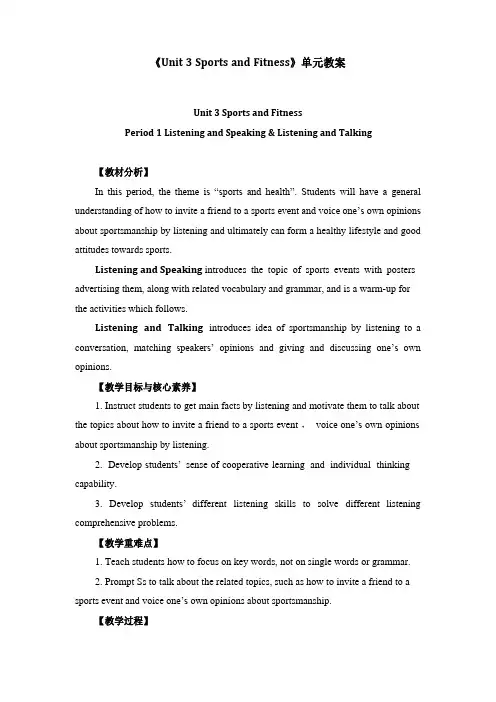
《Unit 3 Sports and Fitness》单元教案Unit 3 Sports and FitnessPeriod 1 Listening and Speaking & Listening and Talking【教材分析】In this period, the theme is “sports and health”. Students will have a general understanding of how to invite a friend to a sports event and voice one’s own opinions about sportsmanship by listening and ultimately can form a healthy lifestyle and good attitudes towards sports.Listening and Speaking introduces the topic of sports events with posters advertising them, along with related vocabulary and grammar, and is a warm-up for the activities which follows.Listening and Talking introduces idea of sportsmanship by listening to a conversation, matching speakers’ opinions and giving and discussing one’s own opinions.【教学目标与核心素养】1.Instruct students to get main facts by listening and motivate them to talk about the topics about how to invite a friend to a sports event ,voice one’s own opinions about sportsmanship by listening.2.Develop students’sense of cooperative learning and individual thinking capability.3.Develop students’different listening skills to solve different listening comprehensive problems.【教学重难点】1.Teach students how to focus on key words, not on single words or grammar.2.Prompt Ss to talk about the related topics, such as how to invite a friend to a sports event and voice one’s own opinions about sportsmanship.【教学过程】Part 1: Listening and SpeakingLead inThe teacher is advised to talk with their students about sports events.Boys and girls, look at the posters on p36, what sports events do you like to watch? Which sports would you like to try? After their small talk, the teacher can move on by finishing the following listening task:Play conversation 1 which is about Shen Qi’s main purpose for talking to Amy and after finishing listening for the first time, the students need to solve the following tasks.1.Purpose2.Listen to conversation 1 again and write down the words that the speaker stresses:Listening tip:Listen for main ideas.Try to catch the main ideas instead of trying to remember and translate each word you hear.After finishing the task above, the teacher is expected to play conversation 2 which is about Adam’s inviting Julie to a sports event and after finishing listening, the students need to solve the following task.Listen to Conversation 2. Then answer the following questions:1.When will the event happen?The event will happen2.What”s a “Blue Paint“ run?A “Blue Paint“ run is a fun run that3.Why is it called a “Blue Paint“ run?Because people can buy water ballons flled with and the runners.4.If 200 people take part in the run and 400 balloons are sold, how much money will they collect?Finally, after finishing the task above, the teacher is expected to instruct students to work in groups to finish the following project:Speaking ProjectWhat event or activity would you like to invite your friend to? Make a conversation with a partner.Ski Race: Zhangjiakou, a beautiful city in northern China, will host the Youth Ski Race in December.Track Meet: a great event for track –and –field lovers on 26 October.Gym Class: come and work out at a gym! You can make it.Part 2: Listening and Talking:The teacher is advised to talk with their new students about the related topic:Boys and girls , what do you think of sportsmanship? Let’s listen and find out: Play the listening and match each opinion with the right speaker. Who do you agree with? Why?Cao Jing Lily MaxA.An athlete should do his/her best to win.B.The girl should stop and help the other girl. Good sportsmanship is more important than wining!C.An athlete should think about honor and his/her fans if he/she is competing for his/her country.Listen again and circle the expressions that you hear in the conversation.agreeingI agree.So do I. Exactly!All right Good idea. Yes, I think so. disagreeingI”m sorry, but I disagree/don”t agree. I don”t think so. That”s not right.That doesn”t make any sense! That”s not how I see it.I see what you mean, but …Me too.Sure./Certainly./Of course. You”re right/correct.I guess so.Talking projectWork in groups. Choose one of the situations below and make a conversation:●A soccer player should not pretend to fall down even if it helps his/her team.●In school teams, everyone should get a chance to play, not only the best players.●It is wrong to pay people millions of yuan to play sports.●Athletes should play only for their own country.EXAMPLEA: I agree with the idea that a soccer player should never pretend to fall down even if it helps his or her team. You should never cheat.B: Exactly! It”s important to do the right thing.C: Well, don”t think so. Many players do it, and they think it helps their team to win. A: That doesn”t make any sense!B: I see what you mean, but the audience wants fair play.Unit 3 Sports and Fitness-Listening and Speaking & Listening and Talking【教材分析】This lesson focuses on the discourse analysis of its organization and features. Through the questions, the students are guided to sort out why Lang Ping and Jordan are masters and what role models they set. On this basis, the students are allowed to use the language they have learned to talk about the sports stars in their minds.【教学目标与核心素养】1.Read quickly to get basic information about Lang Ping and Jordan; read deeply to understand why they can be called sports legends.2.Understand the meaning of some languages in the context of the text through question guidance, such as “time seems to stand still, graceful“ and so on.3.Read and clarify the context of each part of the text, learning how to talk a write sports legends.4.Through comparativeanalysis,w e can form the criterif aor judgingthelegendary figures and learn to choose the legendary sports stars we like.【教学重难点】1.Get basic information about Lang Ping and Jordan; read deeply2.Understand why they can be called sports legends.3.Understand the meaning of some languages in the context of the text, such as “time seems to stand still, graceful“ and so on.【教学过程】Step 1 Leading-in1.Have the Ss ask and answer in pairs.Q1: Who are your favorite sports player?Q2: Do you like him/her? Why?2.Then ask the Ss to talk about Lang Ping and Michael Jordan, and have several Ss to share their ideas.Q1: What do you know about Lang Ping and Michael Jordan?Q2: What else do you want to know about them?Step 2Understanding the title and the lead paragraph.Have the Ss think about the title and answer the following questions.Q1: Why do you think the author chooses to write these two sports stars?Q2: What does “living legend” mean?Q3: What are the standards or requirements to be chosen as a living legend of sports star?Then discussthe questionsabove in groups,then have someone to sharetheir ideas.Step 3 Getting detailed information about Lang Ping1.Read to answer the following questions.Living legends Jordan Masters?Good examples?Q1: Is Lang Ping a master in her area? How do you know that?Q2: What good examples does Lang Ping set for others?2.Read again and Focus on the story about Lang Ping. Then try to retell the story of Lang Ping.Step 4 Exploring detailed information about Michael Jordan1.Read the paragraph of Michael Jordan and complete the following table.We have got to know why Lang Ping is a living legend. Now read and find out why Michael Jordan is a living legend on your own by completing the following table.2.Sort out detailed information about Michael Jordan.(1)Understand the transitional sentence.Q: Which part is about Michael Jordan as a master? Which part is about the example he set?(2)Have the Ss Focus on why Michael Jordan is a master and what good examples Michael Jordan set when they’re reading. And think about these questions as below:Q1: How does the author describe his impressive skills?Q2: How do you understand “time seemed to stand still”?Q3: What does “graceful” mean?Q4. Which sentence do you think best describes his mental strength?Q5. Which words is important in the sentence in describing his mental strength? Why?Q6: How do you understand “unique”?Q7: What can we learn from Michael Jordan?Step 5 Discussing and recommendingRecommend their own living legends of sports.Work in groups to choose your own living legend of sports and give the reasons of your choice.Step 6 HomeworkReview the stories of Lang Ping and Michael Jordan, and try to retell them.Unit 3 Sports and FitnessPeriod 3 Discovering Useful Structures—tag questions【教材分析】This teaching period mainly deals with the grammar: tag questions.This period carries a considerable significance to the cultivation of students’spoken English. The teacher is expected to enable students to master this period thoroughly and consolidate the knowledge by doing some exercise of good quality. 【教学目标与核心素养】1.Get students to have a good understanding of the basic usages of tag questions.2.Enable students to use the basic phrases structures flexibly.3.Develop students’ speaking and cooperating abilities.4.Strengthen students’ great interest in grammar learning.【教学重难点】1.How to enable students to have a good understanding of the basic usages of tag questions.2.How to enable students to use the basic usages of tag questions flexibly.【教学过程】Step1: 语法自主探究一、根本组成方法1. 确定式陈述You often play badminton, don’t you?你常常打羽毛球,是吗?局部+否认附加You are going to the gym with me, aren’t you?疑问局部〔前肯你要和我一起去健身房,是吗?她以前去过上海,是后否〕She’s been to shanghai before, hasn’t she?吗?2.否认式陈述It isn”t a beautiful flower, is it?那不是秀丽的花,是吗?局部+确定附加You didn”t go skating yesterday, did you? 你昨天没去滑冰,是疑问局部〔前否吗?后肯〕They can’t finish it by Friday, can they?他们不能在星期五之前完成,是吗?3.含有否认词〔1 〕当陈述句中含有He hardly goes to school by car, 的附加疑问句seldom, hardly, never, does he?rarely, little, few, none, 他几乎不开车去上学,是吗?neither ,no, not, nowhere, You have never been to Paris, havenothing no one, nobody 等you?否认意义的词时,后面的你从没去过巴黎,是吗?附加疑问句则为确定形They seldom come late, do they?式。
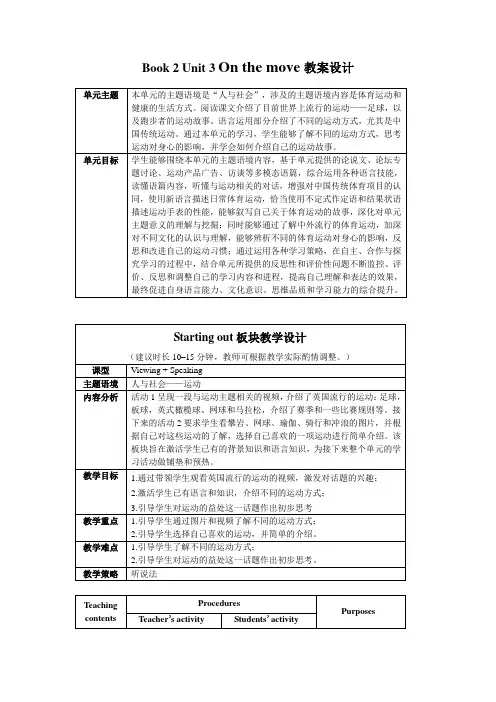
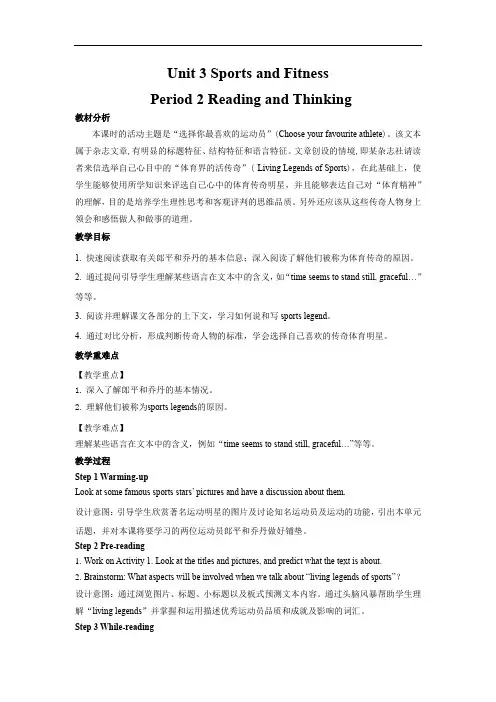
Unit 3 Sports and FitnessPeriod 2 Reading and Thinking教材分析本课时的活动主题是“选择你最喜欢的运动员”(Choose your favourite athlete)。
该文本属于杂志文章,有明显的标题特征、结构特征和语言特征。
文章创设的情境,即某杂志社请读者来信选举自己心目中的“体育界的活传奇”( Living Legends of Sports),在此基础上,使学生能够使用所学知识来评选自己心中的体育传奇明星,并且能够表达自己对“体育精神”的理解,目的是培养学生理性思考和客观评判的思维品质。
另外还应该从这些传奇人物身上领会和感悟做人和做事的道理。
教学目标1. 快速阅读获取有关郎平和乔丹的基本信息;深入阅读了解他们被称为体育传奇的原因。
2. 通过提问引导学生理解某些语言在文本中的含义,如“time seems to stand still, graceful…”等等。
3. 阅读并理解课文各部分的上下文,学习如何说和写sports legend。
4. 通过对比分析,形成判断传奇人物的标准,学会选择自己喜欢的传奇体育明星。
教学重难点【教学重点】1.深入了解郎平和乔丹的基本情况。
2.理解他们被称为sports legends的原因。
【教学难点】理解某些语言在文本中的含义,例如“time seems to stand still, graceful…”等等。
教学过程Step 1 Warming-upLook at some famous sports stars’ pictures and have a discussion about them.设计意图:引导学生欣赏著名运动明星的图片及讨论知名运动员及运动的功能,引出本单元话题,并对本课将要学习的两位运动员郎平和乔丹做好铺垫。
Step 2 Pre-reading1.Work on Activity 1. Look at the titles and pictures, and predict what the text is about.2.Brainstorm: What aspects will be involved when we talk about “living legends of sports”?设计意图:通过浏览图片、标题、小标题以及板式预测文本内容。
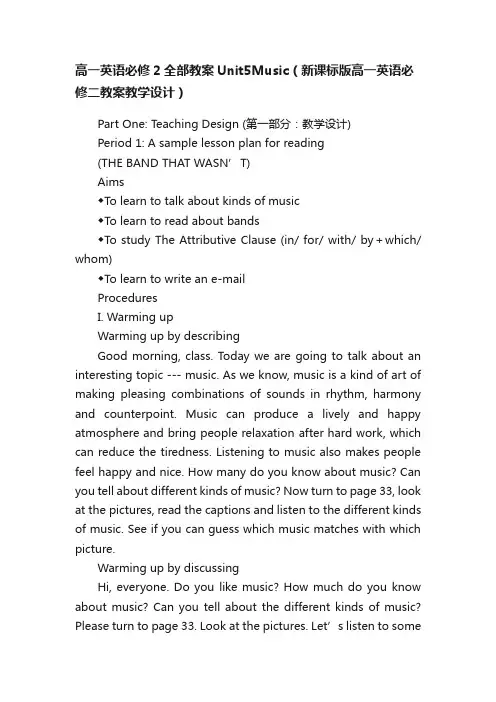
高一英语必修2全部教案Unit5Music(新课标版高一英语必修二教案教学设计)Part One: Teaching Design (第一部分:教学设计)Period 1: A sample lesson plan for reading(THE BAND THAT WASN’T)Aims◆To learn to talk about kinds of music◆To learn to read about bands◆To study The Attributive Clause (in/ for/ with/ by+which/ whom)◆To learn to write an e-mailProceduresI. Warming upWarming up by describingGood morning, class. Today we are going to talk about an interesting topic --- music. As we know, music is a kind of art of making pleasing combinations of sounds in rhythm, harmony and counterpoint. Music can produce a lively and happy atmosphere and bring people relaxation after hard work, which can reduce the tiredness. Listening to music also makes people feel happy and nice. How many do you know about music? Can you tell about different kinds of music? Now turn to page 33, look at the pictures, read the captions and listen to the different kinds of music. See if you can guess which music matches with which picture.Warming up by discussingHi, everyone. Do you like music? How much do you know about music? Can you tell about the different kinds of music? Please turn to page 33. Look at the pictures. Let’s listen to somemusic. Let’s see if you can guess which music matches with which picture.Classical music Country music Rock ‘n’ RollRap Orchestra Folk musicYes, you are right. I’m sure you will really enjoy yourselves after listening to all these beautiful music. What kind of music do you like better, Chinese or Western, classical or modern? Why? How does music make you feel? Why do you like to listen to music? Let’s discuss these questions in small groups. Try to share your opinions with one another.II. Pre-reading1.Thinking and sayingHave you heard about any of the famous bands in the world? List some if you can.For reference: I’ve heard about “The Beatles”, “Back Street Boys”, “The Eagles”, “West life” and “Pink Floyd”.2.Listening, talking and sharingLet’s listen to some pieces of music from different bands. Work in groups of four. Tell your group mates which band you like best. Why? Then the group leader is to stand up and share the group idea with the class.F or reference: I am from Group 1. Our group likes “The Beatles” best. We like their style of performances. Listening to their performances, we will feel relaxed, amused, and their performances make us think a lot about life.Do you know anything about “The Monkees”?For reference: “The Monkees” is a band that was first popular in the 1960s in America. Unlike most bands of the time, the Monkees were not formed by its members but rather by TV producers. They were a fictional band in the TV show of the samename. The band was composed of Mike Nesmith, Mickey Dolenz, Davy Jones, and Peter Tork. All the members had some musical experience. Let’s come to the reading --- The Band That Wasn’t and find more about them.III. Reading1.Reading aloud to the recordingNow please listen and read aloud to the recording of the text THE BAND THAT WASN’T. Pay attention to the pronunciation of each word and the pauses within each sentence. I will play the tape twice and you shall read aloud twice, too.2.Reading and underliningNext you are to read and underline all the useful expressions or collocations in the passage. Copy them to your notebook after class as homework.Collocations from THE BAND THAT WASN’Tdream of doing , at a concert , with sb. clapping and enjoying …, sing karaoke , be honest with oneself, get to form a band, high school students, practice one’s music, play to passers-by, in the subway, earn some extra money, begin as a TV show, play jokes on…, be based loosely on…, the TV organizers, make good music, put an advertisement in a newspaper, look for rock musicians, pretend to do sth., the attractive performances, be copied by…, support them fiercely, become more serious about…, play their own instruments, produce one’s own records, start touring, break up, in the mid-1980s, a celebration of one’s time as a real band3.Reading to identify the topic sentence of each paragraphSkim the text and identify the topic sentence of each paragraph. You may find it either at the beginning, the middle or the end of the paragraph.1st paragraph: How do people get to form a band?2nd paragraph: Most musicians meet and form a band.3rd paragraph: One band started as a TV show.4th paragraph: “The Monkees” became even more popular than “The Beatles”.3.Reading and transferring informationRead the text again to complete the tables, which list how people formed a band and how The Monkees was formed by the TV organizers and became a real band.How do people get to form a band?展开全文阅读Members High school studentsReasons They like to write and play music.Places They practice their music in someone’s home.Forms They may play to passers-by in the street or subway.Results They can earn some extra money. They may also have a chance to dream of becoming famous.How was The Monkees formed and became a real band?The Monkees in 1968 (left to right): Micky Dolenz, Peter Tork, Mike Nesmith & Davy Jonesbeginning of the band It began as a TV show.style of the performance They played jokes on each other as well as played music.first music and jokes Most of them were based loosely on the band called “The Beatles”.development of the band They became more serious about their work and started to play their own instruments and write their own songs like a real band. They produced their own records and started touring and playing their own music.changes of the band The band broke up in about 1970, but reunited in the mid-1980s. They produced a new record in 1996,which was a celebration of their time as a real band.4. Reading and understanding difficult sentencesAs you have read the text times, you can surely tell which sentences are difficult to understand. Now put your questions concerning the difficult points to me.IV. Closing downClosing down by doing exercisesTo end the lesson you are to do the comprehending exercises No. 1, 2, 3 and 4.Closing down by having a discussionDo you think the TV organizers were right to call “The Monkees” a band when they did not sing or write their own songs? Why?For reference: I don’t think the TV organizers were right to call “The Monkees” a band when they did not sing or write their own songs because singing and writing its own songs was the basis of a band.Do you agree that the jokes were more important than the music for this band? Give a reason.For reference: Yes. I think it is the jokes that really attract more fans.No. I think the purpose of forming a band is getting people to enjoy the spirit of music. It’s more important than playing jokes just to make people laugh.Closing down by retelling the form of the band The Monkees.I shall write some key words and expressions on the board. You are to retell the form of the band according to these words.For reference: begin as a TV show, the TV organizers, look for, put an advertisement in a newspaper, use actors for the other members of the band, pretend to singPeriod 2: A sample lesson plan for Learning about Language (The Attributive Clause (in/ for/ with/ by+which/ whom).AimsTo help students learn about the Attributive Clause with a preposition in front.To help students discover and learn to use some useful words and expressions.To help students discover and learn to use some useful structures.ProceduresI. Warming upWarming up by discovering useful words and expressionsTurn to page 35 and do exercises No. 1, 2 and 3 first. Check your answers against your classmates’.II. Learning about grammar1.Reading and thinkingTurn to page 34 and read with me the text of THE BAND THAT WASN’t. As you read on, pay attention to The Attributive Clause (in/ for/ with/ by+which/ whom), that is, the attributive clauses with a preposition ahead of the relative pronoun shown in the sentences.For reference: The musicians of whom the band was formed played jokes on each other as well as played music. However, after a year or so in which they became more serious about their work, “The Monkees” started to play their own instruments and write their own songs like a real band.2.Doing exercises No. 1 and 2 on page 35Turn to page 34. Look at the two sentences:The musicians of whom the band was formed played jokes on each other as well as played music.However, after a year or so in which they became more serious about their work, “The Monkees” started to play their own instruments and write their own songs like a real band.Pay attention to the structure: preposition + relative pronoun. Usually only two relative pronouns --- which and whom--- can be used in the Attributive Clause, with a preposition put before the clause. That can’t be used. Look at the screen. Here are m ore examples on this kind of structure.1.This is the reason for which he left his hometown. (=why)2.I’ll never forget the day on which we stayed together. (=when)3.This is the girl from whom I learned the news.4.The person to whom I spoke just now is the manager thatI told you about.5.I’ll show you a store in which you may buy all that you need.(=where)6.I don’t like the way in which you laughed at her.(=that)Now go on to do Exercise No. 2 on page 36, that is, to sort out the sentences.III. Ready used materials for The Attributive Clause (in/ for/ with/ by+which/ whom)In formal styles we often put a preposition before the relative pronouns which and whom:The rate at which a material heats up depends on its chemical composition.In the novel by Peters, on which the film is based, the main character is a teenager.An actor with whom Gelson had previously worked contacted him about the role.Her many friends, among whom I like to be considered, gaveher encouragement.Notice that after a preposition you can’t use who in place of whom, and you can’t use that or zero relative pronoun either: Is it right that politicians should make important decisions without consulting the public to whom they are accountable? (not --- the public to who they are accountable.)The valley in which the town lies is heavily polluted. (not --- The valley in that the town...)Arnold tried to gauge the speed at which they were traveling. (not --- the speed at they were traveling.)In informal English we usually put the preposition at the end in attributive clauses rather than at the beginning:The office which Graham led the way to was filled with books.Jim’s footballing ability, which he was noted for, had been encouraged by his parents.The playground wasn’t used by those chi ldren who it was built for.In this case we prefer who rather than whom (although whom is used in formal contexts). In restrictive attributive clauses we can also use that or zero relative pronoun instead of who or which (e.g. ...the children (that) it was built for).展开余文If the verb in attributive clauses is a two-or-three-word verb (e.g. come across, fill in, go through, look after, look up to, put up with, take on) we don’t usually put the preposition at the beginning:Your essay is one of those (which/t hat) I’ll go through tomorrow. (rather than...through which I’ll go tomorrow.) She is one of the few people (who/that) I look up to. (not ... to whom I look up.)In formal written English, we often prefer to use of whichrather than whose to talk about things:A huge amount of oil was spilled, the effects of which are still being felt. (or...whose effects are still being felt.)The end of the war, the anniversary of which is on the 16th of November, will be commemorated in cities throughout the country. (or...whose anniversary is on...)Note that we can’t use of which in place of whose in the patterns described in Unit 71B:Dorothy was able to switch between German, Polish and Russian, all of which she spoke fluently. (not..,all whose she spoke...)We can sometimes use that...of in place of of which. This is less formal than of which and whose, and is mainly used in spoken English:The school that she is head of is closing down. (or The school of which she is head...)Whose can come after a preposition in attributive clauses. However, it is more natural to put the preposition at the end in less formal contexts and in spoken English:We were grateful to Mr. Marks, in whose car we had traveled home. (or...whose car we had traveled home in.)I now turn to Freud, from whose work the following quotation is taken. (or...whose work the following quotation is taken from.)IV. Closing down by doing exercises:Join the sentence halves using which or whom after an appropriate preposition. (A)a. I would never have finished the work.b. It was primarily written.c. We know nothing.d. They got a good view.e. He learned how to play chess.f. Dennis scored three goals in the final.g. She was born.h. It was discovered.1.They climbed up to the top of a large rock.2. I would like to thank my tutor.3. She has now moved back to the house on Long Island.4. The star is to be named after Patrick Jenks.S. This is the ball.6. He is now able to beat his father.7. The book is enjoyed by adults as well as children.8. There are still many things in our solar system.Key for reference:1.They climbed up to the top of a large rock, from which they got a good view.2. I would like to thank my tutor, without whom I would never have finished the work.3. She has now moved back to the house on Long Island, in which she was born.4. The star is to be named after Patrick Jenks, by whom it was discovered.S. This is the ball. Dennis scored three goals in the final.6. He is now able to beat his father, from whom he learned how to play chess.7. The book is enjoyed by adults as well as children, about whom it was primarily written.8. There are still many things in our solar system, about which we know nothing.Are these correct or appropriate? If they are, put a√. If theyare not, give a reason, correct them and give alternatives if you can. (A)I. It's a piece of jewelry across which I came in an antique shop. --- which I came across in an antique shop. (‘came across’ is a two-word verb.)2. The extra work which she took on was starting to affect her health.3. My mother, after whom I looked for over 20 years, died last year.4. The people whom I work with are all very friendly.5. Some of the criticisms with which they had to put up were very unfair.6. He had many friends with whom he had a regular correspondence.7. The woman to who he is engaged comes from Poland.8. The forms which I had to fill in were very complicated.Rewrite these sentences so that they are more appropriate for formal written English. Use preposition + which or preposition + whose, as appropriate. (B)I. Tom Sims, whose car the weapons were found in, has been arrested. Torn Sims, in whose car the weapons were found, has been arrested.2. Tom Ham, whose novel the TV series is based on, will appear in the first episode.3. Dr Jackson owns the castle whose grounds the main road passes through.4. Tessa Parsons is now managing director of Simons, the company that she was once a secretary in.5. Allowing the weapons to be sold is an action that the Government should be ashamed of.6. The dragonfly is an insect that we know very little of.Period 3: A sample lesson plan for Using LanguageAimsTo read the story about Freddy and then enjoy and understand Beatles’ songs.To use the language by reading, listening, speaking and writing.ProceduresI. Warming up by listening and writingTurn to page 37 and read these sentences before listening to the tape. Then listen to the tape and decide true or false.II. Guided reading1. Reading and translatingRead more about Freddy’s li fe and translate it into Chinese paragraph by paragraph.2. Reading and underliningNext you are to read and underline all the useful expressions or collocations in the passage. Copy them to your notebook after class as homework.Collocations from Freddy’s lifebecome famous, visit Britain on a tour, wait for hours to get tickets for the concerts, be confident, enjoy singing and all the congratulations, the most exciting experience, sing in a TV program called “T op of the Pops, wear an expensive suit, give a performance to a TV camera, go wrong, not go out without being followed everywhere, wear sunglasses, hide in railway stations, one’s personal life, become too painful for sb., pack one’s bags3. Doing exercisesNow you are going to do exercises No. 3, 4 and 5 on page 38 following the article.Ex3: Here are the incorrect sentences which should be crossed out.1. Freddy and his band always loved being pop stars.2. His favorite program was “Top of the Pops”.3. Things went wrong because Freddy and his band hid themselves.4. They realized they had to go because they were painful.Exercise 4 Answer these questions:1. This is an open question by which students are asked about their opinions.Answers may vary.2. Answers may vary but there is information in the reading passage that may include:--- becoming rich;--- doing a job you want to do;--- having many fans;--- people enjoying your music.3. Answers may vary but information may include:--- peaceful and quiet;--- a private life away from crowds;--- a personal life which others do not discuss.Exercise 5: The main idea is No. 3. This is a story about a band that became famous and did not like it. Only No. 3 best summarizes the main idea, while all the others reflect just part of the main idea. At first, Freddy and his band wanted to be famous, but when he became famous, they were always being followed wherever they went, which they found painful.III. Guided writing1.Writing a letter for advicePlease turn to page 38 writing. Let’s read the instruction s.You and your friends want to start your own band. However, you have never played in a band before. You write an e-mail to Freddy for his advice. The e-mail is started for you, but you have to finish it.You’d better do some brainstorming in small groups before writing your letters. You should follow the procedure for brainstorming and outlining introduced in Module 1 Unit 2.Writing tips:1. In groups discuss some questions you would like to ask Freddy.2. Make a list of them and choose the best questions.3. Share your ideas with another pair; discuss all questions and then decide which ones you want to ask Freddy.4. Use each question to start a new paragraph.5. Write your question first; then add extra information to show Freddy why you need help.6. Finish the letter politely and thank Freddy for his help.2.Reading Freddy’s replyLet’s read Freddy’s reply and answer the questions:--- How was Freddy’s band formed?--- What advice does Freddy give?3.Writing a note and a paragraphPlease turn to page 74. Now in pairs you are going to decide on the best way to tell a foreign friend about one kind of Chinese folk music. What do you think they need to know before they can enjoy it? Why do you like it? Who are your favorite singers? Discuss it with your partner and write notes to remind you of your most important ideas. Then write a paragraph telling your foreign friend about the type of Chinese folk music you have chosen. Use a dictionary and other reference books to help you.展开余文IV. Further applyingFinding informationGo to the library to read or get online to search in order to find more information on music and musicians. Take notes of your findings and report them to your group mates next Monday morning.V. Closing down by filling a formMake use of the text and others to fill in the form below.How do people form a bandMembersReasonsPlacesFormsResultsClosing down by describing a bandTo end this period, I am going to have two of you to describe to the class a band whom you appreciates. W ho’d like to speak first?Part Two: Teaching Resources (第二部分:教学资源)Section 1: A text structure analysis of THE BAND THAT WASN’TI. Type of writing and summary of the ideaType of writing This is a piece of narrative writing.Main idea of the passageThe band The Monkees was formed in quite a different way. It started as a TV show, with musicians played jokes on each other as well as played music, based loosely on the band called The Beatles. As time went on, their attractive performances gained fiercely support from their fans. With their own particular style of performing their band at last became very popular in the USA.Topic sentence of 1st paragraph Have you ever wanted to be a famous singer or musician?Topic sentence of 2nd paragraph Most musicians meet and form a band because they like to play music.Topic sentence of 3rd paragraph However, there was one band that started in a different way.Top sentence of 4th paragraph Their attractive performances were copied by other groups and their fans supported them fiercely.II. A tree diagramIII. A retold passage of the text1. A possible version:Being a famous singer or musician may be the dream of many people. Becoming a member of a band may help you realize the dream. But just how can people form a band?Most musicians often meet and form a band for they are congenial with each other. High school students may also form a band to practice music together or sometimes play in the street to passers-by to earn some extra money, which is also a chance to realize their dreams of becoming famous.However, There was a band which was started in quite a different way. The musicians of whom the band was formed played jokes on each other and played music, loosely based on the Beatles. Their exciting performances were copied by other groups and were fiercely supported by their fans. That band was The Monkees. After a year or so, The Monkees became more serious of their work, playing their own instruments and writing their own music. Though it broke up in 1970, it reunited in the mid-1980s and is still popular today.Section 2: Background information on music, musicians andthe band The MonkeesI. Different types of music:Folk musicIt has been passed down from one generation to another. At first it was never written down. People learned the songs from their families, relatives, neighbors and friends in the same village. These songs were about the country life, the seasons, animals and plants, and about love and sadness in people’s lives.Pop musicIt is a kind of modern music with a strong beat and not of lasting interest, especially just favored for a short time by younger peopleRock ’n’ RollIt is also called rock and roll, a kind of modern music with strong beat, played loudly on electrical instruments, in which the singer repeats the same few simple words.JazzJazz was born in the USA around 1890. It came from work songs sung by black people and had its roots in Africa. Jazz started developing in the 1920s in the southern states. Soon it was played by white musicians, too, and reached other parts of the USA.African musicIt plays an important part in people’s lives, especially for work, and at festivals and weddings, when people dance all night long.Indian musicIt’s not written down. There is a basic pattern of no tes which the musician follows. But a lot of modern music is also written. India also produces films with music, and millions of records aresold every year.Music in the CaribbeanThe slaves who were brought from Africa developed their own kind of music. West Indians make musical instruments out of large oil cans. They hit different parts of the drum with hammers to produce different notes. This type of music has become very famous in Britain and is very good music to dance to.II. Famous musicians:Joseph Haydn(1732-1809)was an Austrian composer and is known as “the father of the symphony”. Other composers had written symphonies before Haydn, but he changed the symphony into a long piece for a large orchestra.He was born in a village in Austria, the son of a peasant. He had a beautiful singing voice. After studying music in Vienna, Haydn went to work at the court of a prince in eastern Austria, where he became director of music. Having worked there for 30 years, Haydn moved to London, where he was very successful.Wolfgang Amadeus Mozart (1756-1791)was a composer, possibly the greatest musical genius of all time. He only lived 35 years and he composed more than 600 pieces of music.Mozart was born in Salzburg, Austria. His father Leopold was a musician and orchestra conductor. Wolfgang had musical talent from a very early age. He learned to play the harpsichord in a concert for the Empress of Austria.By the time he was 14, Mozart had composed many pieces for the harpsichord, piano and violin, as well as for orchestras. While he was still a teenager, Mozart was already a big star and toured Europe giving concerts. Haydn met Mozart in 1781 and was very impressed with him. “He is the greatest composer theworld has known,” he said. The two were friends until Mozart’s death in 1791.Ludwig van Beethoven (1770-1827)was born in Bonn, Germany. He showed musical talent when he was very young, and learned to play the violin and piano from his father, who was a singer. Mozart met Beethoven and was impressed by him. “He will give something wonderful to the world,” he said. Beethoven met Haydn in 1791, but was not impressed by the older man. After they had known each other for many years, Beethoven said, “He is a good composer, but he has taught me nothing.” However, it was Haydn who encouraged Beethoven to move to Vienna. Beethoven became very popular in the Austrian capital and stayed there for the rest of his life. As he grew older, he began to go deaf. He became completely deaf during the last years of his life, but he continued composing.III. Musical instrument 乐器saxophone electrical equipment pianoguitar fluteV. What are the functions of music?Make things more lively and interestingMake things better for people to understand and enjoyExpress people’s feelingMake people feel goodHelp people forget their painAttract people’s attentionhelp people to remember things wellVI. The introduction of the band The MonkeesThe Monkees were a four-person band who appeared in an American television series of the same name, which ran on NBC from 1966 to 1968. The Monkees were formed in 1965 in LosAngeles, California and disbanded in 1970. At their peak they were one of the most popular musical acts of their time.Several reunions of the original lineup have taken place. The first reunion lasted from 1986 to 1989, and a second regrouping took place between 1996-1997. The Monkees last worked together for a brief period in 2001.Section 3: Words and expressions from Unit 5 THE BAND THAT WASN’TI. Words for Readingclassicaladj. (of music)put together and arranged(composed) with serious artistic intentions; having an attraction that lasts over a long period of time(as opposed to popular or folk music)(音乐)古典的Bach and Beethoven wrote classical music. the classical music of India/ the classical symphonyrollvt.&vi. 1. to (cause to) move along by turning over and over (使)滚动We rolled the barrels of oil onto the ship. Tears were rolling down her cheeks. 2. to move steadily and smoothly along(as) on wheels(车轮)滚动;转动The train rolled slowly into the station. The waves rolled over the sand. 3. (of a ship)to swing from side to side with the movement of the waves摇摆;摇晃The ship rolled so heavily that we were all sick.4. keep the ball rolling: to keep things active and moving(使事情,工作等)继续进行下去;不松懈5. set the ball rolling: to be the first to do something, hoping that others will follow带动;带头(希望他人跟随)I’ll sing a song first, just to set the ball rolling.folkadj. of, connected with, or being music or any other art that has grown up among working and/or country people as an。
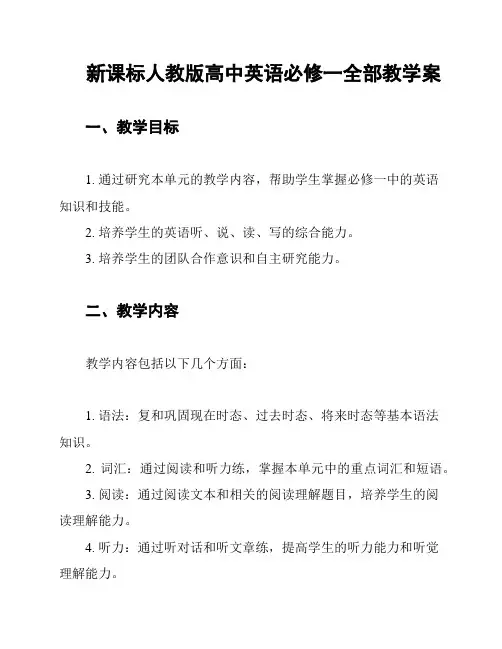
新课标人教版高中英语必修一全部教学案一、教学目标1. 通过研究本单元的教学内容,帮助学生掌握必修一中的英语知识和技能。
2. 培养学生的英语听、说、读、写的综合能力。
3. 培养学生的团队合作意识和自主研究能力。
二、教学内容教学内容包括以下几个方面:1. 语法:复和巩固现在时态、过去时态、将来时态等基本语法知识。
2. 词汇:通过阅读和听力练,掌握本单元中的重点词汇和短语。
3. 阅读:通过阅读文本和相关的阅读理解题目,培养学生的阅读理解能力。
4. 听力:通过听对话和听文章练,提高学生的听力能力和听觉理解能力。
5. 口语:通过各种口语练,提高学生的口语表达能力。
三、教学方法1. 任务型教学法:通过让学生完成一系列任务,激发学生的研究兴趣,加强学生的实际运用能力。
2. 合作研究法:引导学生在小组内进行合作研究,促进学生之间的互动和交流。
3. 归纳法:通过教师引导和学生参与,将教学内容进行总结和归纳,提高学生的研究效果。
四、教学步骤1. 导入:通过引入生活例子或相关资料,唤起学生对新学知识的兴趣。
2. 语法讲解:教师通过讲解和示范,介绍本单元的语法知识。
3. 词汇研究:通过词汇游戏和词汇练,帮助学生记忆和掌握本单元的重点词汇。
4. 阅读训练:教师通过指导学生阅读文本和做阅读理解题目,提高学生的阅读理解能力。
5. 听力训练:教师播放相关听力材料,学生进行听力训练和听觉理解练。
6. 口语练:教师引导学生进行口语练,提高学生的口语表达能力。
7. 总结归纳:教师对本节课的教学内容进行总结和归纳。
8. 作业布置:教师布置相应的作业,巩固学生对本节课的研究。
五、教学评价1. 教师根据学生的课堂表现、作业完成情况和考试成绩等,进行教学评价。
2. 学生之间进行互评,促进学生之间的交流和研究成长。
六、教学资源1. 教材:新课标人教版高中英语必修一教材。
2. 多媒体设备:投影仪、电脑、音响设备等。
3. 课外资料:相关的练册、参考书和教育软件等。
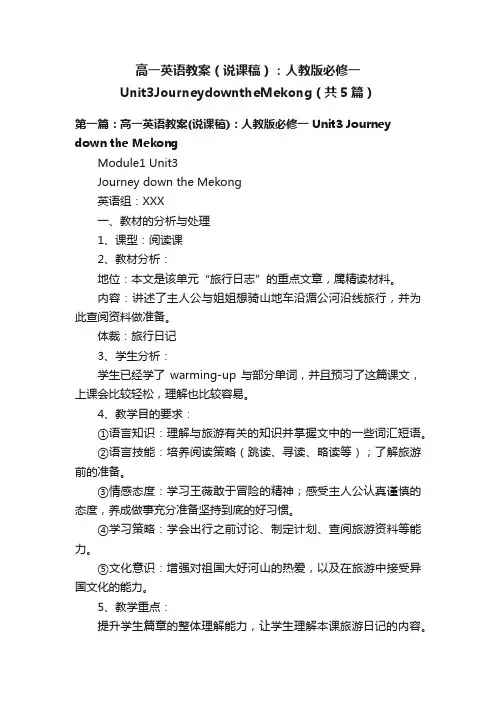
高一英语教案(说课稿):人教版必修一Unit3JourneydowntheMekong(共5篇)第一篇:高一英语教案(说课稿):人教版必修一Unit3 Journey down the MekongModule1 Unit3Journey down the Mekong英语组:XXX一、教材的分析与处理1、课型:阅读课2、教材分析:地位:本文是该单元“旅行日志”的重点文章,属精读材料。
内容:讲述了主人公与姐姐想骑山地车沿湄公河沿线旅行,并为此查阅资料做准备。
体裁:旅行日记3、学生分析:学生已经学了warming-up与部分单词,并且预习了这篇课文,上课会比较轻松,理解也比较容易。
4、教学目的要求:①语言知识:理解与旅游有关的知识并掌握文中的一些词汇短语。
②语言技能:培养阅读策略(跳读、寻读、略读等);了解旅游前的准备。
③情感态度:学习王薇敢于冒险的精神;感受主人公认真谨慎的态度,养成做事充分准备坚持到底的好习惯。
④学习策略:学会出行之前讨论、制定计划、查阅旅游资料等能力。
⑤文化意识:增强对祖国大好河山的热爱,以及在旅游中接受异国文化的能力。
5、教学重点:提升学生篇章的整体理解能力,让学生理解本课旅游日记的内容。
6、教学难点:(1)利用跳读、寻读等策略来找出关键词或主题句。
(2)以阅读课为依托,训练学生听、说、读、写及小组合作的能力。
二、教学方法与手段1、教学方法与手段:任务型教学法,情景教学法,讲授法。
(1)通过设置情景和教师讲授,帮助学生了解和学习关于湄公河的信息,激发学生的兴趣,为学习课文做铺垫。
(2)运用任务型教学法,通过读前、读中、读后的任务设计,引导学生理解文章的内容。
2、教学辅助:多媒体三、教学过程Step1: Lead in Ask some students to present their dialogue.(The homework of last class)【设计说明】采用对话形式导入,营造出宽松的学习气氛,为学生全面的课堂参与作了铺垫。
Teaching planTeaching aims:1. Get the students to learn different reading skills.2. Get the students to learn about the English language.Teaching important points:1. Develop the students reading ability and let them learn to use some reading strategies such as skimming, scanning, and so on.2.Enable the students to learn about English language and know different kinds of English so as to communicate with people from different countries.Teaching difficult points:Develop the students’ readi ng ability.Teaching methods :Task-based teaching and learningUnit 2English around the world知识目标:本单元需要学习的重点单词为:include role international native elevator flat apartment rubber petrol gas modern culture AD actually present(adj. )rule(v. ) vocabulary usage identity government Singapore Malaysia rapidly phrase candy lorry command request retell polite boss standard Midwestern southern Spanish eastern southeastern northwestern recognize accent lightning direction ma’am subway block本单元需要学习的重点词组为:play a role in because of come up such as play a part(in) 本单元需要学习的重点句型为:1. World English comes from those countries, where English plays an important role as a first or second language, either because of foreign rule or because of its special role as an international language. (the Attributive Clause; either. . . or. . . )2. Native English speakers can understand each other even if they don’t speak the same kind of English. (even if. . . )3. It became less like German, and more like French because those who ruled England at that time spoke French. (those who. . . )4. Today the number of people learning English in China is increasing rapidly. (the number of+ n. 作主语时,谓语动词用单数形式)5. Believe it or not, there is no such a thing as standard English. (Believe it or not, . . . )6. The US is a large country in which many different dialects are spoken. (the Attributive Clause)7. In fact, an English dictionary like the kind you use today wasn’t made until the time of the Qing Dynasty. (the Attributive Clause; not. . . until. . . )8. These men spent nearly all of their lives trying to collect words for their dictionaries. (spend. . . in doing sth. )9. At the age of fourteen, he left his village school in Scotland and taught himself while working ina bank. (while doing. . . )10. We know that languages develop and change over time and that is why we have new dictionaries from time to time. (that is why. . . )本单元需要掌握的交际功能用语为:语言交际困难(Difficulties in language communication) Pardon?I beg your pardon?I don’t understand.Could you say that again please?Sorry, I can’t follow you.Could you repeat that, please?Could you speak more slowly, please?How do you spell it, please?本单元需要掌握的语法为:祈使句及其间接引语(the imperative sentence and its indirect speech)1. 要求或命令(demands or orders)“Open the door, ” told he.→He told/ordered me to open the door.2. 请求(requests)He said, “Please open the door. /Would you please open the door? ”→He asked me to open the door.能力目标:1. 能运用所学语言知识谈论有关“世界英语”方面的话题。
2022-2021学年高中英语贵州同步教案:Unit2(全单元)(人教新课标必修3) 人教版必修三 unit2 Healthy eating period1 warming up , reading & comprehending step 1:memorize the words from diet to strength (p95-p96) step2: important words and phrases (write down the meaning of the following words and phrases) diet, balance, roast, fry, ought, slim, curiosity, raw, lie, customer, discount, weakness, strength, balanced diet, ought to, lose weight, get away with, tell a lie, win…back step3: translate important sentence patters: 1. wang peng sat in his empty restaurant feeling very frustrated. 2. nothing could be better. 3. suddenly he saw his friend li chang hurrying by. 4 .tired of all that fat? want to lose weight? 5. he could not have yong hui getting away with telling people lies! step 4: underline the words, phrases and sentences in the text book. step 5: background: some information about healthy diet 1. a healthy diet is one that helps maintain or improve health. it is important for the prevention of many chronic health risks such as: obesity, heart disease, diabetes, and cancer. a healthy diet involves consuming appropriate amounts of all nutrients, and an adequate amount of water. nutrients can be obtained from many different foods, so there are a wide variety of diets that may be considered healthy diets. 2. eat a rainbow of fruits and vegetables every day—the brighter the better. the brighter, deeper colored fruits and vegetables contain higher concentrations of vitamins, minerals and antioxidants—and different colors provide different benefits. some great choices are: greens: greens are packed with calcium, magnesium, iron, potassium, zinc, vitamins a, c, e and k, and they help strengthen the blood and respiratory systems. be adventurous with your greens and branch out beyond bright and dark green lettuce—kale, mustard greens, broccoli, chinese cabbage are just a few of the options. sweet vegetables: naturally sweet vegetables add healthy sweetness to your meals and reduce your cravings for other sweets. some examples of sweet vegetables are corn, carrots, beets, sweet potatoes or yams, winter squash, and onions. fruit: a wide variety of fruit is also vital to a healthy diet. fruit provides fiber, vitamins and antioxidants. berries are cancer-fighting, apples provide fiber, oranges and mangos offer vitamin c, and so on.
人教新课标高中英语必修三Unit 1 Festivals around the world全章教案I.教学内容分析本单元的中心话题是“节日”,主要讲述了不同地区不同种类的节日。
Warming Up部分设计了小组活动,通过图表填写让学生区分中国的传统节日与别国节日的异同,目的在于激活学生已有的节日背景知识,引出主题,为以后几堂课学习热身。
Pre-reading 通过几个问题,调动学生已有的知识和经验,激发学生想了解更多节日的好奇心,让他们主动参与到主题教学活动中,为下面学习阅读文章作铺垫。
Reading 部分先简要介绍了一下早期各种节日的起源以及存在的原因,然后又分别介绍了几种世界各地的节日,依次的顺序是亡灵节、纪念名人的节日、丰收节、春天的节日等。
Comprehending由四个部分组成。
第一、三、四部分通过表格形式,第二部分通过让学生回答问题的方式,鼓励学生积极思考,加深对课文的理解。
Learning about Language 部分主要突出了本单元的语法项目——情态动词的用法。
这些情态动词主要有:can,could,may,might,will,would,shall,should,must,can’t 等的用法。
Using Language 部分中包括了听、说、读、写几个部分的内容。
学生可通过对Trinidad Carnival、情人节等一些节日的学习,分析问题,锻炼自己的思维能力。
阅读后的习题及讨论不仅帮助学生理解文章的主旨大意,更重要的是让学生寻找解决问题的方法。
Learning Tip部分主要建议学生搜集各种资料,查询与世界各地节日有关的信息,了解各种节日的来源与内涵。
II.教学重点和难点1. 教学重点(1) 本单元的生词和短语;(2) 掌握一些情态动词的基本用法;(3) 了解有关节日和民俗,掌握有关词汇,如custom,religious等。
2. 教学难点(1) 增进学生对中国节日的理解,了解和感悟外国的节日;(2) 提高学生的社会文化素质,加强跨国文化素质;(3) 培养学生运用资源策略。
人教高中英语必修一unit2教案Module 1 Unit 2 English around the world●单元规划本单元主要围绕English around the world这一主题介绍了英语的使用情况、发展情况及各地不同的方言。
第二单元English around the world的设计可分为五部分。
第一部分learn something about words and expressions;第二部分warming up and reading;第三部分the structure which expresses commands and requests;第四部分using language;第五部分writing and speaking;●课时安排本单元教学可分为6个课时。
第一课时vocabulary;第二课时为reading;第三课时为language points;第四课时为grammar;第五课时为using language;第六课时为writing and speaking;第七课时为revisionThe First Period Words and expressionsTeaching aims :1. Know the key words and expressions in the whole unit:elevator, petrol, official, voyage, actually, base, identity, command, request, recognize, straight, because of, come up, at present, such as, play a part (in)……2. Enable the students to get familiar with the pronunciation of the important words.3. Prepare for the learning process of the whole unit.Teaching important points :1.Get familiar with the words in the text part.2.Master the important expressions such as:bec ause of, come up, at present, such as, play a part (in)……Teaching methods: Task-based teaching and learning; cooperative-learning; group discussionTeaching procedures :Step 1、Self-directed learning学习方法指导:第一步:写出所给单词的音标;第二步:大声朗读三遍,注意画线字母的发音;第三步:依次写出画线字母的音标。
人教版新课标高中英语必修二Unit 1 知识点明细Unit 1Cultural relicsPart 11. have to 强调客观条件的制约而“不得不”。
must 表主观上认为“必须”否定形式是don’t have to和needn’t,不必。
mustn’t是禁止。
2. rare 珍贵的, 稀有的Snow is quite rare in this area。
rarely与hardly, seldom位于句首时,句子用部分倒装语序。
Rarely do we see them nowadays.Hardly had he got home when he began to cook.3. survive survival n. 生存,幸存;survivor n. 幸存者,生还者vi.活下来,幸存Of the 6 people injured in the crash, only 2 survived.Vt. (1) survive sth.幸免于,经历...仍活着(2) survive sb by+时间.比...活得长The company managed to survive the crisis(危机)The old lady survived her husband by ten years.4.in search of =in the/one’s search for 寻找search for 寻找search for my booksearch sb./sp for sth.搜查某人/某地以找到Scientists are in search of a cure for the disease.in need of 需要in favor of 支持in terms of在…方面;就…而言in view of 鉴于,考虑到in danger of 处于危险中in fear of唯恐in case of 以防in charge of 掌管,负责in place of 取代,代替in praise of 为了表扬in memory of为了纪念in honor of 为了纪念;为了庆祝;为了表示敬意5. amaze ( amazing , amazed, amazement) vt.使吃惊sth amaze sb→sb be amazed by/at/with sthto one’s amazement look at sb in amazement【比较】surprise , astonish , amaze6. design vt.design sth for sb→sth be designed for sb为…而设计/准备,打算用作be designed to do ... 目的是by design=on purpose故意(反)by chance/accident偶然地The experiment is designed to test the new drug.The films designed for adults aren’t fit for children.7. fancy (1).adj. 别致的,奇特的These clothes are too fancy for me.(2). vt. 想象,设想;爱好fancy doing sthI can’t fancy h is doing such a thing.Do you fancy a glass of coffee? I don’t fancy walking in the rain.(3).n. 喜爱have a fancy for 爱上…,对…入迷8. decorate vt. 装饰,装潢,点缀,装点decoration n.decorate sth with… 用...装点.→be decorated withThe students are decorating their classroom with flowers and balloons.The classroom is decorated with flowers and balloons.9. jewel 【C.】a jewel 一件珠宝,引申为“受重视的人或物”jewellery 【U.】a piece of jewellery 一件首饰10. belong to 不用于进行时态和被动语态,作定语用v-ingbelongings n. 财产,所有物Put the book back where it belongsOur headmaster keeps telling us that the future ____ the well-prepared.A. belongs toB. is belonged toC. is belonging toD. will be belonged toAs is known to us all, America is a developed country___ the First World. A. belonging B. belonged C. belonging to D. belonged to11. in return/reward for作为...对回报in turn依次,轮流= by turns;转而,反过来Can I buy you lunch in return for your help?Theory is based on practice and in turn serves practice.12. at war 在战争中,交战中at表状态The two countries have been at war for 5 years.at peace/at work/ at play /at school/at table /at breakfast/Part 21. remove the mountain / hat / sb’s doubts / be removed from office(school)移走;脱去;消除;免职,离去I can’t _____ the dirty points from my shirt.2. less than少于rather than而不是more than超过,不仅仅,非常other than除了There is nobody here other than me.The teacher, rather than his students, has been invited.3 doubt n. / vt. 怀疑,疑惑beyond / without doubt 无疑地;必定I doubt whether / if he will comeThere is no doubt that he is right. / I don’t doubt that…There is some doubt whether it is true. (同位语从句)There is no chance/possibility that…不可能There is no need to do…没必要There is no point/sense in doing sth没有意义4. remain link.v 保持是,仍是remain silent/a farmer/ seated/sitting/at homesth remains to be done.It remains to be seen whether her colleagues will agreevi. 剩下,留下remaining /left 剩下的the remaining money / the money leftkeep /remain /staykeep 对原状态的继续和维持keep quiet/keep calm/keep healthy/fit remain周围事物离开或发生变化后,主语仍停留或保持某状态stay 处于静止状态stay awake /stay still5. the former view/boss the former…the latter…前者…后者Of the two plans the latter is better than the former6. be (well) worth n / doing (主动表被动)be worthy of n / of being done /to be doneIt is worthwhile +to do sth. / doing sth.The book is worth reading. The place is worthy of a visit. The book is worthy of being read. The book is worthy to be read. This is a house worth $50,000.7. local adj./n.=native 本地的;本地人8. apart adv.分离,不在一起;相隔/距We are living apart now. The two houses are 500 meters apart. take apart拆开/卸tell apart 辨别,区分apart from 除…之外put/set sb apart from sb 使…显得优越或独特The little boy took the clock apart to find out how it worked.His use of language sets him apart from other modern writers.9. prove+ n./ clause/sb (to be)adj./n vt.We have proved our courage in battle. He proved himself to be honest.Franklin’s experiment proved that lightning and electricity are the same.link. v+ (to be) + adj. /n.结果是,证明是What he said proved (to be) right.=turn out10. evidence Un.证据,证词;痕迹,迹象; 明显/白It is evident/clear/obvious that…很显然11. trial n.审判;试验be on trial在试验/审判中trial and error 反复试验,不断摸索undergo(stand)trial受审判12. agree with + sb./sb’s words/what sb. said/sb’opinionagree to+ plan /arrangement /decisionagree on在某方面达成一致The damp weather doesn’t agree with me.13. think(speak) highly/well/much of 高度评价think badly/poorly/little/ill of 对…评价低think nothing of it别在意/客气,没什么(交际);不把…当一回事,觉得…无所谓She thinks nothing of walking thirty miles a day.14. debate vt./vi./n. under debate/hold a debatedebate with sb about sth.Part 3 Summing Up【词汇】rare valuable survive dynasty amaze amazing select design fancy style decorate jewel artist belong troop reception remove wooden doubt former worth local apart painting castle trial evidence explode entrance sailor informal debate【重点词组】in search of belong to in returnless than at war take apart think highly of【语法】定语从句(Ⅲ)1.限制性定语从句In 1770 the room was completed the way she wanted.This was a time when the two countries were at war.2.非限制性定语从句This gift was the Amber Room, which was given this name because several tons of amber were used to make it.。
英语必修2人教新课标Unit 1整体教案(3) Unit 1 cultural relics 教材分析 I.教学内容分析 本单元的话题是“文化遗产”。 Warming up部分首先让学生对文物的定义有所了解,然后让学生讨论文物所应具有的特点,在此基础上让学生看几幅图片,进一步讨论“是不是只有像花瓶这样的东西才算是文物,建筑物算不算文物”这个问题。 Pre-reading部分设计了一个问题让学生对琥珀进行初步的了解,然后快速浏览文章。 Reading部分主要介绍了有关俄罗斯遗失琥珀屋的轶闻。 Learning about Language 部分首先安排了根据英语释义搭配词汇的练习,力求巩固学生对新词汇的理解和记忆;此外,针对本单元的语法重点----定语从句,该部分还包含了相当分量的练习,让学生通过寻找课文中的定语从句启发学生去发现、归纳和复习限制性定语从句,同时引入非限制性定语从句的教学与训练。 Using Language 部分的Reading and listening和speaking主要通过对evidence, fact和opinion三个词的讲解辨析,同时结合琥珀屋离奇失踪这一事件,对学生进行听力训练,有效地帮助学生将所学内容与实际判断能力的培养结合起来。紧随其后的reading and writing对一封信进行讨论之后,根据所给出的提示写一封回信,这一部分通过展示不同人对待国家文化遗产的不同态度,引发学生思考,让他们发表自己的看法,具有现实意义。 Learning Tips 部分鼓励学生去参观博物馆或文化遗产胜地,学习有关的知识,尽力为外国游客提供导游服务,一方面可以借此机会锻炼自己的英语口语,另一方面也可以结交朋友。
II.教学重点和难点 1.教学重点 (1) 本单元的生词和短语。 (2) 掌握限制性与非限制性定语从句的用法,理解两者有何不同。 (3) 了解琥珀屋的历史,了解世界文化遗产,增强文化遗产保护意识。 2.教学难点 (1) 学会区别事实与观点,锻炼思维分析能力。 (2) 用英语表达自己的看法或征求别人的看法。
III.教学计划 本单元分五课时: 第一、二课时:Warming Up,Pre-reading, Reading, Comprehending 第三、四课时: Learning about Language 第五课时: Using Language
Periods 5 Using language Teaching Goals: 1. To learn to tell facts from opinions. 2. To write a reply letter. 3. To learn to talk about cultural relics. Teaching Procedures: Step 1 Warming up Purpose: To get Ss to know the difference between a fact and an opinion. 1. Definition A fact must be real, objective and without a personal judgment. So it can be proved. An opinion always expresses one’s own ideas. It is always subjunctive. So it has not been proved. 2. Read the passage (P5) and answer the following questions: (1) If you want to go in for law against somebody, and if you want to win, what’s the most important thing you should do first? (2) What makes a judge decide which eyewitness he can believe and which not? Suggested Answers: (1) Searching for facts. The more, the better. (2) The evidences offered by the eyewitnesses. Step 2 Guided reading 1. Read the passage and define what evidence is. 2. Read the passage and translate each paragraph into Chinese. 3. Read and underline all the useful expressions or collocations in the part. Suggested Answers: Collocation from Using Language on page 5 in a trial, rather than, more than, to tell the truth, agree with, It can be proved that ..., no reason to, a reply to, think highly of, search for, return…to… Step 3. Note taking Listen to the tape and fill in the forms (P5). As we know, people have never stopped searching for the Amber Room. This time we'll listen to what three people say they know about the missing Amber Room. Get Ss to share their forms and tell what are facts and what are opinions in the three forms. Step 4 Speaking Purpose: 1. To learn how to ask for or give opinions. 2. To learn how to write a letter of suggestions. 1. Group work (1) We often use some expressions to ask for opinions. What are they? What do you think of ...? Do you believe ... ? How can you be sure of ...? How do you know that? (2) We often use some expressions to give opinions. What are they? I think ... I don't think ... I don't agree that ... I suppose that ...
Suggested Answers: Of the three eyewitnesses, only Anna Petrov has no selfish reason. In particular, she is not involved in any current effort to find the treasure. Therefore she is the most believable. Jan Hasek is less believable because he owns a little restaurant near the mine. If the search stopped, his business would suffer. Hans Braun is also less believable, because somebody has asked him for help. 2. Individual work (1) Sometimes we may fall into or face a moral choice. That is a moral dilemma. Let’s read the letter (P7) and see what's Johann’s choice and opinion. Answer the following questions. ① What's Johann’s opinion about the Amber Room? ② Do you agree with Johann? Step 5. Debate Divide Ss into two groups and organize a debate. Have a class debate and take notes of the main ideas of the two sides and their reasons. At the end take a class vote. ① When you write your letter, you may choose to agree or not agree with the writer. ② You must give a reason why you agree or don't agree with the writer. ③ Be sure to give an example from your own life so that the reader can better understand your opinion. Step 6 Writing Write a report on your debate according to the demand of part 4 of P7.